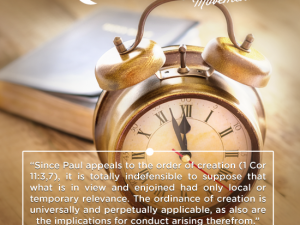Where are Head Coverings to be Practiced? In Church or Everywhere?

“…the head covering for women was understood to belong to the decorum of public worship.” -John Murray [1898-1975] (Professor, Westminster Theological Seminary) 1) Head Coverings and Decorum in Worship: A Letter’ by John Murray. Point #5
The Scriptures tell us that head coverings are required when praying or prophesying. However, an important question we should be asking ourselves is praying and prophesying where?
One side understands this command as pertaining to both public and private life. They would say since we are to “pray without ceasing” (1 Thess 5:17) women should be covered almost all the time.
The second understanding is that head coverings are only commanded for when the local church gathers together in worship. This view gets its understanding from the context the passage is found in.
Let’s jump in by examining how the passage regarding head coverings is laid out.
The Commending Link
When you look at the structure of 1 Corinthians 11, it’s divided up very neatly. Verse 2 states “Now I praise you” followed by teaching on a topic they were practicing (head covering). Then in verse 17 he contrasts his first statement by saying “I do not praise you” followed by teaching on two practices they were misusing (Lord’s supper & spiritual gifts).
What we need to ask ourselves is, what connects the three topics Paul deals with in this section?
John Murray explains the connection:
There is good reason for believing that the apostle is thinking of conduct in the public assemblies of the church of God and of worship exercises therein in verse 17, this is clearly the case, and verse 18 is confirmatory. But there is a distinct similarity between the terms of verse 17 and of verse 2. Verse 2 begins, “Now I praise you” and verse 17, “Now in this . . . I praise you not”. The virtually identical expressions, the one positive and the other negative, would suggest, if not require, that both have in view the behavior of the saints in their assemblies 2) Head Coverings and Decorum in Worship: A Letter’ by John Murray. Point #3
The reason why these three topics are linked together is because they’re all dealing with issues pertaining to corporate worship. Verses 2 and 17 connect the topics together and verse 18, “when you come together as a church”, clearly shows what Paul is addressing.
Murray continues:
If a radical difference, that between private and public, were contemplated, it would be difficult to maintain the appropriateness of the contrast between “I praise you” and “I praise you not”. 3) Head Coverings and Decorum in Worship: A Letter’ by John Murray. Point #3
New Testament Prophecy
Another clue that Paul has the local church in mind is that he says we’re to practice this when we prophesy. This is important because Paul’s understanding of prophecy in 1 Corinthians is a gift that edifies the church.
See sometimes we know where we’re talking about by what we’re talking about. If I mention taking the Lord’s supper, do you know where I’m talking about? Of course! The Lord’s supper is to be eaten when we meet together as a church. It’s not something you practice in private. The same is for prophecy which we’ll look at now.
Let’s spend some time in 1 Corinthians 14 looking at Paul’s view of prophecy.
But one who prophesies speaks to men for edification and exhortation and consolation. (1 Cor 14:3 NASB)
Prophecy according to Paul is not a private gift. It’s for the edification and exhortation of people.
One who speaks in a tongue edifies himself; but one who prophesies edifies the church. (1 Cor 14:4 NASB)
The people being edified by prophecy is the gathered church. So once again this is a gift to be used in community.
Therefore if the whole church assembles together and all speak in tongues, and ungifted men or unbelievers enter, will they not say that you are mad? But if all prophesy, and an unbeliever or an ungifted man enters, he is convicted by all, he is called to account by all; the secrets of his heart are disclosed; and so he will fall on his face and worship God, declaring that God is certainly among you. (1 Cor 14:23-25 NASB)
Here we have a contrast of uninterpreted tongues and prophecy. Look at the context, prophecy is happening when “the whole church assembles together” (v.23).
Let two or three prophets speak, and let the others pass judgment. But if a revelation is made to another who is seated, the first one must keep silent. For you can all prophesy one by one, so that all may learn and all may be exhorted (1 Cor 14:29-31 NASB)
Finally, Paul understands that prophetic words need to be judged by the men (1 Cor 14:33-35) in the local church.
Summary
So when Paul refers to prophecy, he expects it to be happening corporately. Though we do pray privately, it is also one of the primary things we’re called to do corporately (1 Tim 2:1-3). Because the context links this passage together with teaching that is explicitly for when the church is gathered together (1 Cor 11:17-18, 11:20,33), it’s best to understand Paul as having corporate practices in mind.
*Note: Though this is our official position, we respect those who understand that this should not be limited to the local church gathering. Women who cover outside of church will not be treated differently then those who don’t on this site. We extend charity to you and hope you will extend it back to us in this matter.
FOLLOW UP: Since writing this article we have answered numerous questions and objections regarding this view. Please consult the following articles:
- Is the Lord’s Supper the first time Paul dealt with Church Issues?
- Can Head Covering be limited to Church if the arguments Paul uses apply at all times?
- Is Corporate Worship Limited to the Sunday Service?
References
- Rediscovering the Forgotten Practice of Head Covering - November 22, 2025
- The Head Covering Movement’s New Direction: A Call for Team Members - July 11, 2025
- Is Head Covering Related to Spiritual Gifts? A Response to Barry York - July 5, 2023



